12 may 2018
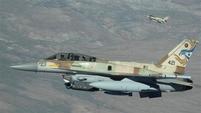
Israeli warplanes have targeted northern Gaza Strip just hours after Tel Aviv announced the closure of the only goods border crossing into the Palestinian sliver.
The Israel Air Force targeted a power station and fired seven missiles at an agricultural area east of the city of Beit Hanoun, Palestinian reports said on Saturday.
There were no initial reports of casualties as a result of the raid.
An Israeli military spokeswoman confirmed that the explosions in Gaza were related to Israeli military “activity.”
Earlier in the day, Israel closed a key border crossing into the besieged Gaza Strip as the Tel Aviv regime intensifies its crackdown on the anti-occupation protests in the Palestinian enclave.
The Israeli military claimed in a statement that Kerem Shalom border crossing would remain closed “until the damage caused by” Palestinian protesters were repaired.
It said the terminal, the main passage point for goods entering the Gaza Strip, would “reopen in accordance with a situation assessment.”
The closure of the border crossing came a day after thousands of Palestinians took part in protests along the border between Gaza and the occupied territories. Israeli forces opened fire on the anti-occupation protesters, killing a Palestinian man and wounding 170 others.
Friday’s killings raised to 53 the death toll of unarmed Palestinian protesters who have lost their lives by Israeli forces’ live fire since the protests began along the Gaza border on March 30. The Israeli regime has faced international criticism over its use of live fire.
The Palestinian rallies, known as the “Great March of Return,” will last until May 15, coinciding with the 70th anniversary of Nakba Day (Day of Catastrophe), when Israel was created.
Every year on May 15, Palestinians all over the world hold demonstrations to commemorate the day, which marks the anniversary of the forcible eviction of hundreds of thousands of Palestinians from their homeland by Israelis in 1948.
According to witnesses, Israeli troops used a drone to down flaming kites that demonstrators flew over the border in a bid to torch bushes and distract snipers.
During the Friday protests, senior leader of the Palestinian resistance movement Hamas Ismail Haniyeh said Palestinians on Monday and Tuesday, when the mass protests are due to climax, would stand "as one man to tell the American president and Israel that al-Quds is Arab, Islamic, no one will change its identity."
Yahya Sinwar, the political chief of Hamas, said on Thursday that he hoped to see hundreds of thousands of Palestinians storm the fence between Gaza and the occupied territories during protests next week that will coincide with the US embassy move to Jerusalem al-Quds.
Last December, US President Donald Trump announced his decision to recognize Jerusalem al-Quds as Israel’s so-called capital and relocate the US embassy from Tel Aviv to occupied Jerusalem al-Quds, breaking with decades of American policy.
His decision infuriated the Palestinians, who declared that Washington could no longer play a role as a mediator in the so-called Middle East peace process. It also sparked outrage across the Muslim world and even among Washington's Arab allies.
On December 21, the United Nations General Assembly overwhelmingly voted in favor of a resolution that calls on the US to withdraw its controversial recognition of Jerusalem al-Quds as the Israeli “capital.”
Separately, Palestinians in the Gaza Strip held a funeral procession for a Palestinian man killed by Israeli forces during the rallies Friday.
Jabr Salem Abu Mustafa succumbed to his wounds inflicted by Israeli troops during a protest rally east of Khan Younis in southern Gaza.
The Israel Air Force targeted a power station and fired seven missiles at an agricultural area east of the city of Beit Hanoun, Palestinian reports said on Saturday.
There were no initial reports of casualties as a result of the raid.
An Israeli military spokeswoman confirmed that the explosions in Gaza were related to Israeli military “activity.”
Earlier in the day, Israel closed a key border crossing into the besieged Gaza Strip as the Tel Aviv regime intensifies its crackdown on the anti-occupation protests in the Palestinian enclave.
The Israeli military claimed in a statement that Kerem Shalom border crossing would remain closed “until the damage caused by” Palestinian protesters were repaired.
It said the terminal, the main passage point for goods entering the Gaza Strip, would “reopen in accordance with a situation assessment.”
The closure of the border crossing came a day after thousands of Palestinians took part in protests along the border between Gaza and the occupied territories. Israeli forces opened fire on the anti-occupation protesters, killing a Palestinian man and wounding 170 others.
Friday’s killings raised to 53 the death toll of unarmed Palestinian protesters who have lost their lives by Israeli forces’ live fire since the protests began along the Gaza border on March 30. The Israeli regime has faced international criticism over its use of live fire.
The Palestinian rallies, known as the “Great March of Return,” will last until May 15, coinciding with the 70th anniversary of Nakba Day (Day of Catastrophe), when Israel was created.
Every year on May 15, Palestinians all over the world hold demonstrations to commemorate the day, which marks the anniversary of the forcible eviction of hundreds of thousands of Palestinians from their homeland by Israelis in 1948.
According to witnesses, Israeli troops used a drone to down flaming kites that demonstrators flew over the border in a bid to torch bushes and distract snipers.
During the Friday protests, senior leader of the Palestinian resistance movement Hamas Ismail Haniyeh said Palestinians on Monday and Tuesday, when the mass protests are due to climax, would stand "as one man to tell the American president and Israel that al-Quds is Arab, Islamic, no one will change its identity."
Yahya Sinwar, the political chief of Hamas, said on Thursday that he hoped to see hundreds of thousands of Palestinians storm the fence between Gaza and the occupied territories during protests next week that will coincide with the US embassy move to Jerusalem al-Quds.
Last December, US President Donald Trump announced his decision to recognize Jerusalem al-Quds as Israel’s so-called capital and relocate the US embassy from Tel Aviv to occupied Jerusalem al-Quds, breaking with decades of American policy.
His decision infuriated the Palestinians, who declared that Washington could no longer play a role as a mediator in the so-called Middle East peace process. It also sparked outrage across the Muslim world and even among Washington's Arab allies.
On December 21, the United Nations General Assembly overwhelmingly voted in favor of a resolution that calls on the US to withdraw its controversial recognition of Jerusalem al-Quds as the Israeli “capital.”
Separately, Palestinians in the Gaza Strip held a funeral procession for a Palestinian man killed by Israeli forces during the rallies Friday.
Jabr Salem Abu Mustafa succumbed to his wounds inflicted by Israeli troops during a protest rally east of Khan Younis in southern Gaza.
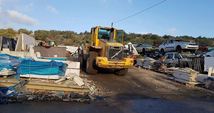
The representative of the European Union (EU) and heads of its mission in Jerusalem and Ramallah have condemned Israel’s demolition of structures and appropriation of equipment funded by the EU in Masafer Yatta area of the occupied West Bank.
In a statement released on Thursday, the EU officials expressed strong concern about the demolition and seizure by the Israeli authorities of several Palestinian-owned structures in four Palestinian communities located in the Masafer Yatta area in Area C of the occupied West Bank, on May 2, 2018, pointing out that several of these structures were funded by the EU and EU member states.
“More than 40 Palestinian residents of these communities have lost their homes. The seizure of solar energy units, as well as water filtration systems, deprives them of access to energy and water,” their statement said.
They called on the Israeli authorities “to halt demolitions of Palestinian houses and property, in accordance with its obligations as an occupying power under international humanitarian law, and to cease the policy of settlement construction and expansion, of designating land for exclusive Israeli use and of denying Palestinian development.”
They also demanded the Israeli authorities to rebuild the structures in the same place, and return the seized items to the communities.
In a statement released on Thursday, the EU officials expressed strong concern about the demolition and seizure by the Israeli authorities of several Palestinian-owned structures in four Palestinian communities located in the Masafer Yatta area in Area C of the occupied West Bank, on May 2, 2018, pointing out that several of these structures were funded by the EU and EU member states.
“More than 40 Palestinian residents of these communities have lost their homes. The seizure of solar energy units, as well as water filtration systems, deprives them of access to energy and water,” their statement said.
They called on the Israeli authorities “to halt demolitions of Palestinian houses and property, in accordance with its obligations as an occupying power under international humanitarian law, and to cease the policy of settlement construction and expansion, of designating land for exclusive Israeli use and of denying Palestinian development.”
They also demanded the Israeli authorities to rebuild the structures in the same place, and return the seized items to the communities.

Israeli bulldozers on Saturday morning leveled vast tracts of Palestinian land in Wad Abdel Rahman north of Salfit.
Eyewitnesses said that the bulldozers, which belong to the Israeli authorities, leveled several dunums of land in the area, without notifying their owners, in preparation for the establishment of a new cemetery for Israeli settlers.
Anti-settlement researcher Khaled Ma'ali told the PIC reporter that lately dozens of dunums of land have been bulldozed in favor of the establishment of an infrastructure network and other settler facilities on privately-owned Palestinian farmlands.
Ma'ali pointed out that the Israeli authorities confiscated red soil, stones and rocks from these lands to be used for gardens of settler houses and sidewalks in Ariel settlement.
He added that many Israeli bulldozing operations have been carried out recently without prior notice in Salfit, especially following the US recognition of Jerusalem as Israel's capital.
This, he continued to say, violates all international laws, particularly the Fourth Geneva Convention which prohibits the occupying power from building on occupied territories.
Eyewitnesses said that the bulldozers, which belong to the Israeli authorities, leveled several dunums of land in the area, without notifying their owners, in preparation for the establishment of a new cemetery for Israeli settlers.
Anti-settlement researcher Khaled Ma'ali told the PIC reporter that lately dozens of dunums of land have been bulldozed in favor of the establishment of an infrastructure network and other settler facilities on privately-owned Palestinian farmlands.
Ma'ali pointed out that the Israeli authorities confiscated red soil, stones and rocks from these lands to be used for gardens of settler houses and sidewalks in Ariel settlement.
He added that many Israeli bulldozing operations have been carried out recently without prior notice in Salfit, especially following the US recognition of Jerusalem as Israel's capital.
This, he continued to say, violates all international laws, particularly the Fourth Geneva Convention which prohibits the occupying power from building on occupied territories.
10 may 2018
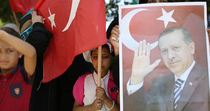
UNRWA has declared that it has received a donation worth 10 million US dollars from Turkey in support of its programs.
UNRWA said in a press release on Wednesday that Turkey pledged 26,000 metric tons of wheat in support of nearly one million refugees in the besieged Gaza Strip.
Turkish president Recep Erdogan met with UNRWA commissioner general Pierre Krahenbuhl in Ankara on Tuesday.
According to the press release, Erdogan stressed his commitment to the support of the agency and the Palestinian refugees, saying "we will stand with UNRWA at this delicate time and mobilize our national mechanisms to support its 'Dignity is Priceless' campaign during Ramadan."
Krahenbuhl considered the meeting "a source of encouragement,” and stressed that “UNRWA services for 526,000 students and millions of Palestine refugees must be preserved."
UNRWA said in a press release on Wednesday that Turkey pledged 26,000 metric tons of wheat in support of nearly one million refugees in the besieged Gaza Strip.
Turkish president Recep Erdogan met with UNRWA commissioner general Pierre Krahenbuhl in Ankara on Tuesday.
According to the press release, Erdogan stressed his commitment to the support of the agency and the Palestinian refugees, saying "we will stand with UNRWA at this delicate time and mobilize our national mechanisms to support its 'Dignity is Priceless' campaign during Ramadan."
Krahenbuhl considered the meeting "a source of encouragement,” and stressed that “UNRWA services for 526,000 students and millions of Palestine refugees must be preserved."
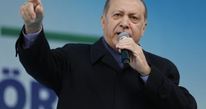
The Turkish presidency has announced the launch of a humanitarian aid campaign to help the Palestinians during the holy month of Ramadan in cooperation with the UN.
Turkish presidential spokesman Ibrahim Kalin told a news conference on Wednesday that his country decided to take step after the US administration shrank its aid to the Palestinian Authority.
Kalin affirmed that Turkish president Recep Erdogan, in his capacity as chairman of the Organization of Islamic Cooperation, would send letters to leaders of Islamic countries to urge them to launch similar campaigns to support the Palestinians.
He described the intended opening of the US embassy in Occupied Jerusalem on May 14 as “null and void to Turkey,” stressing that his country would continue its efforts to protect the religious and cultural identity of the holy city, “which is a red line to Ankara.”
Turkish presidential spokesman Ibrahim Kalin told a news conference on Wednesday that his country decided to take step after the US administration shrank its aid to the Palestinian Authority.
Kalin affirmed that Turkish president Recep Erdogan, in his capacity as chairman of the Organization of Islamic Cooperation, would send letters to leaders of Islamic countries to urge them to launch similar campaigns to support the Palestinians.
He described the intended opening of the US embassy in Occupied Jerusalem on May 14 as “null and void to Turkey,” stressing that his country would continue its efforts to protect the religious and cultural identity of the holy city, “which is a red line to Ankara.”
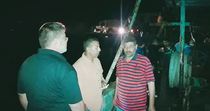
Five Palestinian fishermen survived on Wednesday evening after the Israeli occupation navy attacked and sank their boat off the northern shores of the Gaza Strip.
According to the committee of Gaza fishermen, a fishing boat belonging to a fisherman called Omar al-Habeel was sunk by an Israeli gunboat off the coast of al-Waha area in northern Gaza.
All five fishermen aboard the boat survived following a rescue mission.
Later on the same day, at least one Israeli gunboat opened machinegun fire at fishermen as they were working aboard their boats off the coast of Khan Younis in southern Gaza.
Luckily, no one was injured in the shooting attack.
Israeli gunboats are around Gaza fishermen almost every day, harassing them, shooting at them, damaging their boats, and making arrests. Sometimes fishermen are injured or killed during gunfire attacks.
Under the 1993 Oslo accords, Palestinian fishermen are permitted to fish up to 20 nautical miles off the coast of Gaza, but since then Israel has kept reducing the fishing area gradually to a limit of three nautical miles, especially as part of its blockade on Gaza.
Fishermen and human rights groups also say that, since the 2008-09 war in Gaza, the Israeli army has been regularly enforcing a limit even closer to the shore.
According to the committee of Gaza fishermen, a fishing boat belonging to a fisherman called Omar al-Habeel was sunk by an Israeli gunboat off the coast of al-Waha area in northern Gaza.
All five fishermen aboard the boat survived following a rescue mission.
Later on the same day, at least one Israeli gunboat opened machinegun fire at fishermen as they were working aboard their boats off the coast of Khan Younis in southern Gaza.
Luckily, no one was injured in the shooting attack.
Israeli gunboats are around Gaza fishermen almost every day, harassing them, shooting at them, damaging their boats, and making arrests. Sometimes fishermen are injured or killed during gunfire attacks.
Under the 1993 Oslo accords, Palestinian fishermen are permitted to fish up to 20 nautical miles off the coast of Gaza, but since then Israel has kept reducing the fishing area gradually to a limit of three nautical miles, especially as part of its blockade on Gaza.
Fishermen and human rights groups also say that, since the 2008-09 war in Gaza, the Israeli army has been regularly enforcing a limit even closer to the shore.
9 may 2018
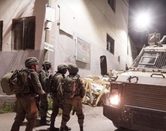
Israeli soldiers abducted, on Wednesday at dawn, at least fourteen Palestinians from their homes, after invading and violently searching them, in several parts of the occupied West Bank. The soldiers also caused fire in olive orchards and wheat fields.
Media sources in Nablus, in the northern part of the occupied West Bank, said the soldiers abducted four Palestinians, identified as Bader-Eddin Ahmad Hamadna, Omar Dirar Jarar’a, Bara’ Issam Jarar’a and Mohammad Omar Shouli, from their homes in ‘Aseera ash-Shamaliya town, north of the city.
In Salfit, in northwestern West Bank, the soldiers searched homes and abducted two Palestinians, identified as Ali Mofeed Zeidan, 20, and Mohammad Maher al-Qadi, 32.
Furthermore, the soldiers invaded ‘Azzoun town, north of Qalqilia in northern West Bank, searched many homes and abducted Mohannad Farouq Abu Haniyya.
The soldiers also fired many gas bombs and concussion grenades while withdrawing from Azzoun, causing fires in wheat fields and olive orchards.
In occupied Jerusalem, the soldiers also searched and ransacked homes and abducted seven Palestinians, including a child.
The abducted residents have been identified as Mohammad Zakaria ‘Oleyyan, Qussai Dari, Ahmad Sa’ad Mustafa, Mohammad Tha’er Mahmoud, Anas Ali Dirbas, Saleh Abu Assab and a child, Ali Amjad Atiya.
Media sources in Nablus, in the northern part of the occupied West Bank, said the soldiers abducted four Palestinians, identified as Bader-Eddin Ahmad Hamadna, Omar Dirar Jarar’a, Bara’ Issam Jarar’a and Mohammad Omar Shouli, from their homes in ‘Aseera ash-Shamaliya town, north of the city.
In Salfit, in northwestern West Bank, the soldiers searched homes and abducted two Palestinians, identified as Ali Mofeed Zeidan, 20, and Mohammad Maher al-Qadi, 32.
Furthermore, the soldiers invaded ‘Azzoun town, north of Qalqilia in northern West Bank, searched many homes and abducted Mohannad Farouq Abu Haniyya.
The soldiers also fired many gas bombs and concussion grenades while withdrawing from Azzoun, causing fires in wheat fields and olive orchards.
In occupied Jerusalem, the soldiers also searched and ransacked homes and abducted seven Palestinians, including a child.
The abducted residents have been identified as Mohammad Zakaria ‘Oleyyan, Qussai Dari, Ahmad Sa’ad Mustafa, Mohammad Tha’er Mahmoud, Anas Ali Dirbas, Saleh Abu Assab and a child, Ali Amjad Atiya.
8 may 2018
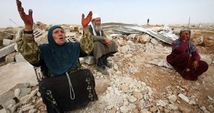
Israeli settlers, Tuesday, dumped wastewater into an agricultural land belonging to a Palestinian family in the town of Beit Ummar, to the north of the southern West Bank city of Hebron, said a local official.
Yousef Abu Maria, an anti-settlement activist in the town, told WAFA that settlers from the nearby illegal Israeli settlement of Gush Etzion dumped waste water into an agricultural land planted with grapes, to the north of the town, in an attempt to force the Palestinians to abandon their land as a prelude to seize it for the benefit of settlement expansion.
He maintained that, at this time of year, farmers in areas adjacent to the illegal settlements established to the north of Hebron suffer from settler violations and attacks against them, which inflicts heavy losses.
Yousef Abu Maria, an anti-settlement activist in the town, told WAFA that settlers from the nearby illegal Israeli settlement of Gush Etzion dumped waste water into an agricultural land planted with grapes, to the north of the town, in an attempt to force the Palestinians to abandon their land as a prelude to seize it for the benefit of settlement expansion.
He maintained that, at this time of year, farmers in areas adjacent to the illegal settlements established to the north of Hebron suffer from settler violations and attacks against them, which inflicts heavy losses.
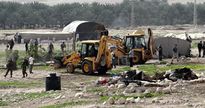
The Israeli occupation forces (IOF) on Monday seized heavy construction equipment in the town of al-Khader, west of Bethlehem in the West Bank, at the pretext of unlicensed construction.
Local official Ahmed Salah said that the Israel army’s civil administration confiscated a bulldozer and a concrete mixer from a construction site in al-Balou area of the town.
Salah told Quds Press that the civil administration claimed that Palestinian construction activities are forbidden in Area C of the West Bank, which is under Israel’s security and administrative control, and need special permits.
The Israeli occupation authority continues to prevent the Palestinian landowners from building on their own lands or demolish their homes in Area C, which constitutes 60 percent of the West Bank, as part of a series of measures aimed at forcing the native residents to leave the area to pave the way for more settlement projects for Jewish settlers.
Local official Ahmed Salah said that the Israel army’s civil administration confiscated a bulldozer and a concrete mixer from a construction site in al-Balou area of the town.
Salah told Quds Press that the civil administration claimed that Palestinian construction activities are forbidden in Area C of the West Bank, which is under Israel’s security and administrative control, and need special permits.
The Israeli occupation authority continues to prevent the Palestinian landowners from building on their own lands or demolish their homes in Area C, which constitutes 60 percent of the West Bank, as part of a series of measures aimed at forcing the native residents to leave the area to pave the way for more settlement projects for Jewish settlers.
7 may 2018
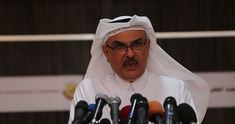
Qatar has offered Gaza a new grant estimated at a $13.7 million for health, education and housing services in addition to humanitarian needs.
Ambassador Mohammed al-Emadi, who arrived in Gaza last night in an unannounced visit, told pressmen before leaving Gaza on Monday that the aid is a continuation of Qatar’s relief and humanitarian role especially with the advent of the holy month of Ramadan.
Qatar announced last Tuesday signing contracts of new projects in Gaza with a budget of 5 million dollars as part of its relief efforts for the Palestinian people and for Gaza reconstruction.
Ambassador Mohammed al-Emadi, who arrived in Gaza last night in an unannounced visit, told pressmen before leaving Gaza on Monday that the aid is a continuation of Qatar’s relief and humanitarian role especially with the advent of the holy month of Ramadan.
Qatar announced last Tuesday signing contracts of new projects in Gaza with a budget of 5 million dollars as part of its relief efforts for the Palestinian people and for Gaza reconstruction.

Head of the Popular Committee Against the Siege Jamal al-Khudari on Monday called on Arab Red Crescent societies and concerned international organizations to urgently send medical aid to Gaza to save its collapsing health sector.
Al-Khudari said in statements that Gaza hospitals have unprecedentedly run out of 50% of much-needed drugs and medical supplies.
Al-Khudari pointed out that 80% of the Gaza Strip residents live below the poverty line with $2 per capita daily income, adding that food insecurity rate in the besieged enclave has reached 60%.
He said that over a quarter of a million Gazan workers are currently unemployed, noting that about one million refugees live on limited aid from UNRWA which is suffering from accumulated fiscal deficit due to US and Israeli pressures.
The Palestinian official continued to say that 25% of the homes that were completely destroyed during the 2014 Israeli offensive on Gaza have not been reconstructed yet because of the lack of funding and building materials.
Moreover, according to al-Khudari, 95% of Gaza's water is undrinkable, while the two million residents of the besieged territory suffer from power outages that last for 18-20 hours a day.
Al-Khudari said in statements that Gaza hospitals have unprecedentedly run out of 50% of much-needed drugs and medical supplies.
Al-Khudari pointed out that 80% of the Gaza Strip residents live below the poverty line with $2 per capita daily income, adding that food insecurity rate in the besieged enclave has reached 60%.
He said that over a quarter of a million Gazan workers are currently unemployed, noting that about one million refugees live on limited aid from UNRWA which is suffering from accumulated fiscal deficit due to US and Israeli pressures.
The Palestinian official continued to say that 25% of the homes that were completely destroyed during the 2014 Israeli offensive on Gaza have not been reconstructed yet because of the lack of funding and building materials.
Moreover, according to al-Khudari, 95% of Gaza's water is undrinkable, while the two million residents of the besieged territory suffer from power outages that last for 18-20 hours a day.
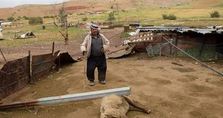
The Israeli military on Sunday evening threatened to cut water supplies to al-Ras al-Ahmar community, in the northern Jordan Valley.
According to local sources, Israeli soldiers notified the local farmers of their intent to break down pipelines providing water to Sahl Atouf community, east of Tamoun town.
The Israeli occupation forces and authorities continue to target agricultural and residential facilities in the Jordan Valley under the guise of military maneuvers and also for the benefit of illegal settlement expansion.
According to local sources, Israeli soldiers notified the local farmers of their intent to break down pipelines providing water to Sahl Atouf community, east of Tamoun town.
The Israeli occupation forces and authorities continue to target agricultural and residential facilities in the Jordan Valley under the guise of military maneuvers and also for the benefit of illegal settlement expansion.
